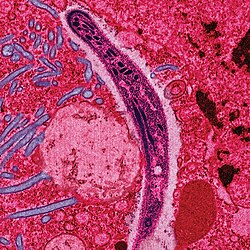 Each year, Malaria kills one to three million people, mostly kids. Caused by protozoan parasites of the genus Plasmodium and spread by mosquitos, malaria is one of the most common infectious diseases, and while there is treatment, drug resistance is a constant problem. If the prevalence of malaria continues on its current course, the death rate could double in the next twenty years. All and all, it is a nasty, deadly, and pathogenic problem that scientists are constantly struggling with controlling.
Each year, Malaria kills one to three million people, mostly kids. Caused by protozoan parasites of the genus Plasmodium and spread by mosquitos, malaria is one of the most common infectious diseases, and while there is treatment, drug resistance is a constant problem. If the prevalence of malaria continues on its current course, the death rate could double in the next twenty years. All and all, it is a nasty, deadly, and pathogenic problem that scientists are constantly struggling with controlling.
One route scientists have taken to help stop malaria is to reduce the number of mosquitos that spread it. Since the parasite can only be spread by mosquito bite, methods to reduce mosquito populations or bites are highly effective. In the past this meant nets, insecticides, and other means of killing mosquitos. However, with the marvels of modern science, John's Hopkin's researchers have created a genetically engineered species of mosquito to compete with natural populations (published in PNAS).
The new mosquito is essentially the same as the other species of Anopheles that live in malaria-rich areas, but with an added bonus - a gene that makes them resistant to Plasmodium.
 However, you can't go around and catch every mosquito in the tropics and replace it with a resistant one. Instead, a population of resistant mosquitos would have to establish themselves, thus limiting the number of available hosts for the parasite. To do this the GM mosquitos have to be more fit and out-reproduce the non-resistant ones.
However, you can't go around and catch every mosquito in the tropics and replace it with a resistant one. Instead, a population of resistant mosquitos would have to establish themselves, thus limiting the number of available hosts for the parasite. To do this the GM mosquitos have to be more fit and out-reproduce the non-resistant ones.
Previous studies have looked at increased immune responses to accomplish resistance, but the cost of increasing immune function negated the benefits, meaning that mosquitos weren't able to replace non-resistant ones. Instead of upping their immune systems, this study uses a transgene to create a chemical product that kills the parasite before the mosquito's immune system even has to respond to the infection. Because the product is otherwise harmless, the GM mosquitos were able to out-complete wild-type mosquitos when fed infected blood. Genetically engineered mosquitos were about 25% less likely to die early and had more young, with females laying an average of 60 eggs compared to the 43 eggs lain by infected individuals.
Even though the gene is 'harmless,' resistant mosquitos only outmuscled about 40% of the wild-type individuals in 50/50 caged experiments, as opposed to the total domination expected by researchers. This suggests that two copies of the gene may have other consequences, meaning that introduction of these mosquitos into the wild would not completely wipe out disease-carrying cousins. On top of that, in the field there are even more variables to think about, like mating strategies and infection rates, meaning the resistance gene might not spread as quickly as it did in the lab. If these mosquitos were to be utilized, however, they could complement other malaria control methods. Since malaria infects upwards of 500 million people a year, any reduction in the disease-carrying population would drastically reduce infection rates. GM mosquitos may just be the next big step in ridding the world of a parasite that has infected us for thousands of years.
